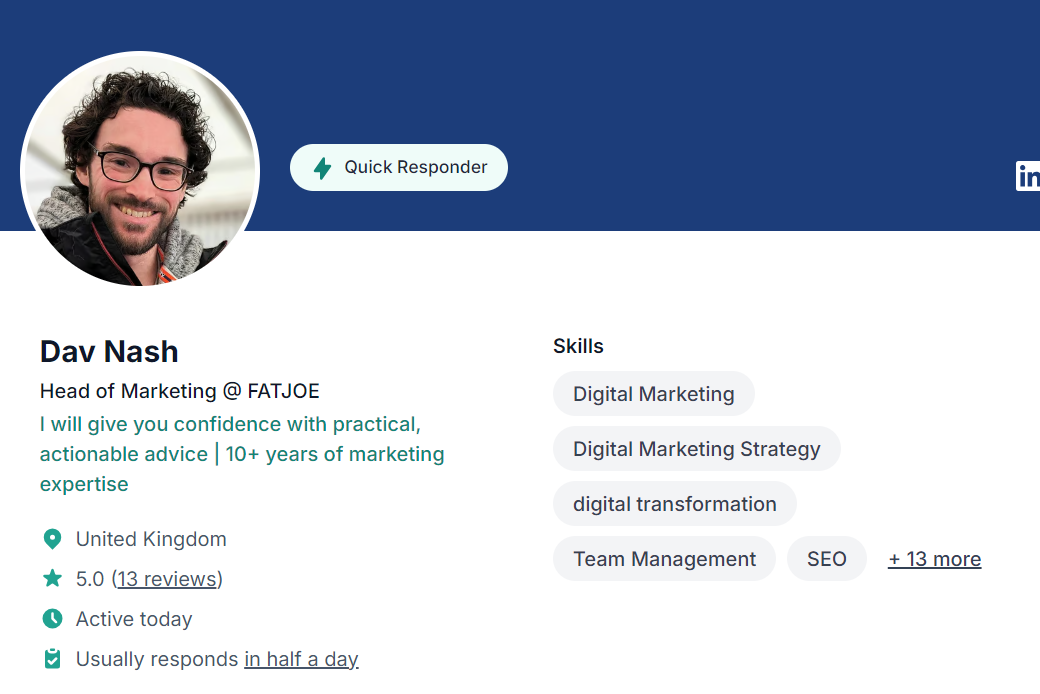Helpful summary
- Why you can trust us: Our mentors have a proven track record of helping professionals overcome various workplace challenges. Our stellar rating of 4.8/5, along with the positive feedback from our clients, demonstrates the effectiveness of our programs.
- Why this is important: Understanding different management skills and how you can acquire them is key to having a cohesive and productive team.
- Action points: We recommend adopting the different team management skills on this list to become a leader who can manage a highly productive and cohesive team.
- Further research: We invite you to explore the personalized mentorship programs on MentroCruise and find a mentor who can nurture and hone your team management skills.
Looking to upgrade your team management skills?
Effective leaders have strong team management skills. In fact, you won’t find a single successful manager who couldn’t maintain harmony and empower their colleagues in the workplace.
At MentorCruise, we understand the importance of team management skills in creating a cohesive and high-functioning workplace. After all, our mentors have worked with dozens of managers to help them do their jobs more effectively.
So, in this article, we will share eight must-have team management skills that every leader needs to ensure workplace productivity and harmony.
But before anything else…
Why listen to us?
MentorCruise has been instrumental in helping professionals from various industries unleash their full potential and perform at the highest level.
Case studies like those of Egle, Monica, and Samantha demonstrate how our mentorship programs have helped countless individuals become better performers at work and level up in their careers as a result.
Hoping to develop and hone your team management skills? Partner with our mentors at MentorCruise and become a better team leader through our 1 on 1 personalized mentorship programs!

What are team management skills?
Team management skills refer to certain abilities that enable leaders to effectively motivate and guide their team members to help them perform at the highest level.
With solid team management skills, a leader can help foster workplace collaboration, enhance productivity, and ensure cooperation among their team members.
Benefits of having strong team management skills
Here are some of the main benefits of having strong team management skills:
Enhanced productivity
Good team management skills lead to clear communication, efficient workflows, and timely completion of tasks.
A leader with effective team management skills will enable their team members to become more productive and efficient in the workplace.
Improved employee morale
Leaders who can properly manage, oversee, and support their team members will create a positive work environment. This leads to higher job satisfaction and retention.
Reduced employee turnover
Effective team management skills help reduce turnover by swiftly addressing employee concerns, providing growth opportunities, and creating a supportive atmosphere within the team and the organization as a whole.
Better problem-solving capabilities
If you have strong team management skills, you can make better use of your team. As a result, you’ll have their full power behind you as you tackle whatever challenges are thrown your way.
Our list of 8 must-have team management skills
1. Open communication
When a team leader can convey instructions clearly, members are more likely to understand their tasks which can improve productivity and performance.
Strong communication skills, such as the ability to convey instructions clearly, provide healthy feedback, and actively listen, are key to effectively leading your team toward success.
Furthermore, leaders who can provide constructive feedback and listen to team members' concerns (and ideas) foster a sense of trust and respect, leading to better collaboration and a more positive work environment.
2. Team building
Team building improves communication, boosts morale, and develops trust among team members. These activities can range from simple group games to more complex problem-solving challenges and outdoor adventures.
Here are some team-building activity ideas you can apply to help your team bond:
- Escape Room Challenge: Divide the team into small groups and have them work together to solve puzzles and find clues to "escape" from a themed room within a set time limit.
- Cooking Competition: Organize a cooking competition where teams must prepare a dish using a set of mystery ingredients within a given timeframe, encouraging creativity and collaboration.
- Outdoor Adventure: Plan a day out for hiking or a ropes course, allowing team members to build trust and improve communication skills through physical challenges and teamwork.
- Volunteer Day: Arrange a day for the team to volunteer at a local charity or community project, fostering a sense of purpose and camaraderie while giving back to the community.
- Workshop or Training Session: Host a skills workshop or professional training session that addresses a common interest or need, promoting continuous learning and collaboration among team members.
3. Proper delegation
Proper delegation skills allow team leaders to optimize productivity and efficiency among team members.
By assigning tasks based on team members' strengths, you ensure they have the means and resources to succeed and get the job done.
Moreover, proper deletion also empowers individuals to perform at their best which fosters professional growth.
4. Recognition and appreciation
Regularly recognizing and appreciating your team members on their performance boosts morale and motivation.
To do so, you should implement a structured recognition program. Here are some guidelines for it:
- Regular Feedback: Provide timely and specific feedback to employees to acknowledge their contributions and guide their development.
- Inclusive Participation: Ensure all team members have equal opportunities to be recognized by setting clear and accessible criteria.
- Personalized Recognition: Tailor recognition methods to individual preferences to make the acknowledgment more meaningful and impactful.
5. Conflict resolution
Team leaders who are adept at resolving conflicts can help maintain order and peace within their team.
By carefully acknowledging issues, facilitating open discussions, and finding mutually acceptable solutions, leaders can quickly resolve conflict and prevent the growth of any toxic team culture.
6. Empathy
Empathizing with team members helps build strong relationships within the workplace.
For starters, empathy allows managers and team members to connect on a deeper level by appreciating each other's experiences and challenges, reducing tension and promoting harmony within the team.
Moreover, being empathetic will help foster a supportive work environment where everyone feels valued and understood.
7. Adaptability
As a leader, your ability to adapt to sudden changes and circumstances is vital for maintaining team momentum and function.
Adaptable leaders and managers can lead their teams through transitions smoothly and maintain productivity during changes in the workplace.
8. Strategic thinking
Managers need to think strategically to set clear goals, anticipate challenges, and devise plans that align with the organization's vision.
Strategic thinking involves regular reflection and adjustment of strategies to quickly move your team in line with the evolving needs of your organization.
3 ways to improve your team management skills
Invest in skill mentorship and training
Exploring mentorship platforms like MentorCruise can connect you with thousands of mentors who possess valuable insights into how to refine your team management skills.

Take Dav Nash, for example, he has plenty of experience managing a team of marketers at FATJOE. If you’re in the marketing industry, he would be a terrific team management mentor for you to work with.
Alternatively, you can enroll in various team management training programs and workshops. Platforms like Coursera and LinkedIn Learning offer a variety of courses that provide you with new strategies and techniques for effective team management.
Practice active listening
Active listening can significantly enhance communication and trust within the team.
To improve your active listening skills, you can practice by fully engaging with team members during conversations. This means making eye contact, nodding to show understanding, and summarizing their points to ensure clarity.
Seek feedback
Regularly ask for feedback from your team about your management style. Understanding their perspective can help you identify areas for improvement and make necessary adjustments.
Enhance team management skills with Mentorcruise
Developing and honing essential team management skills is crucial for any leader aiming to enhance workplace productivity and create a positive work environment.
By working on your communication, conflict resolution, empathy, and other team management skills, you equip yourself with the necessary tools to lead your teams to success.
MentorCruise is a good place to start when you're looking to improve your team management skills.
Our platform connects you with experienced mentors who can provide personalized advice, practical insights, and real-world strategies to help you become an effective team leader.
Start your journey with our free 7-day trial today and become the best team leader you can ever be!







